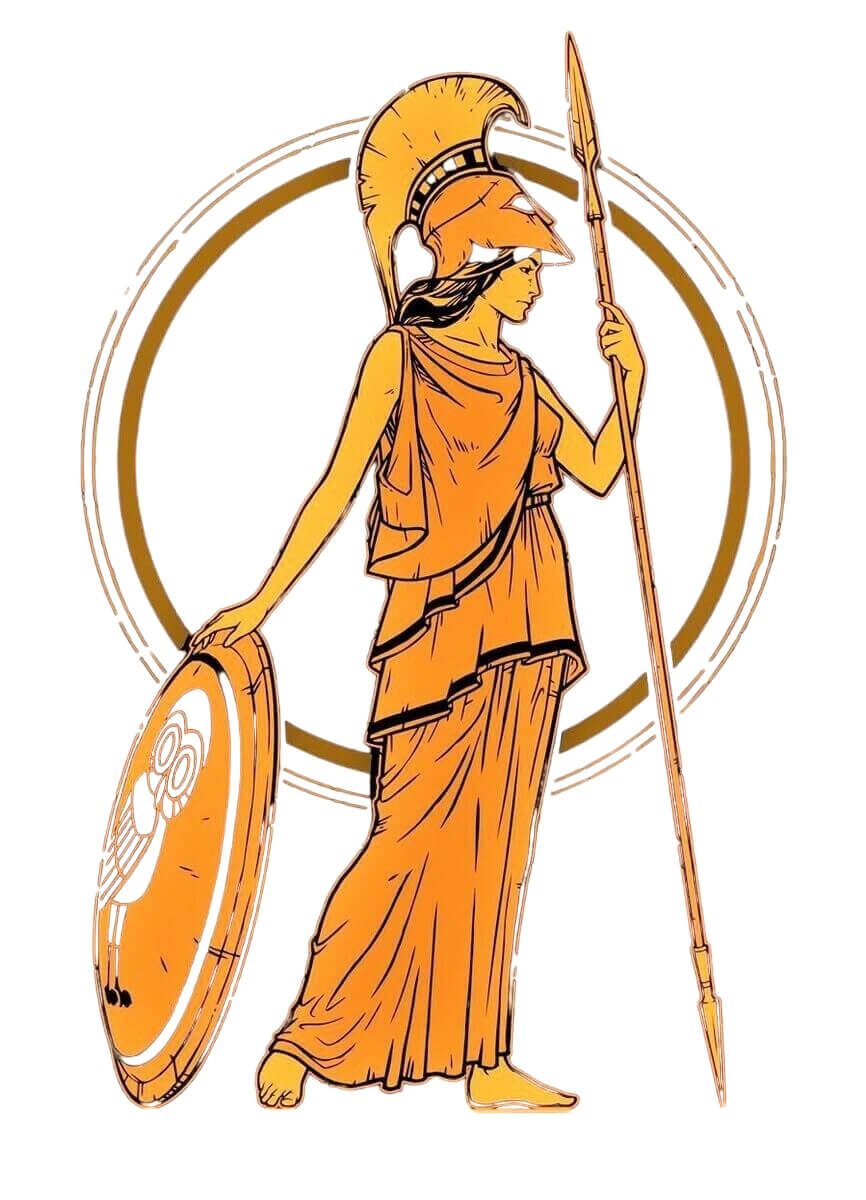Perseus: The slayer of Medusa and true revolutionary
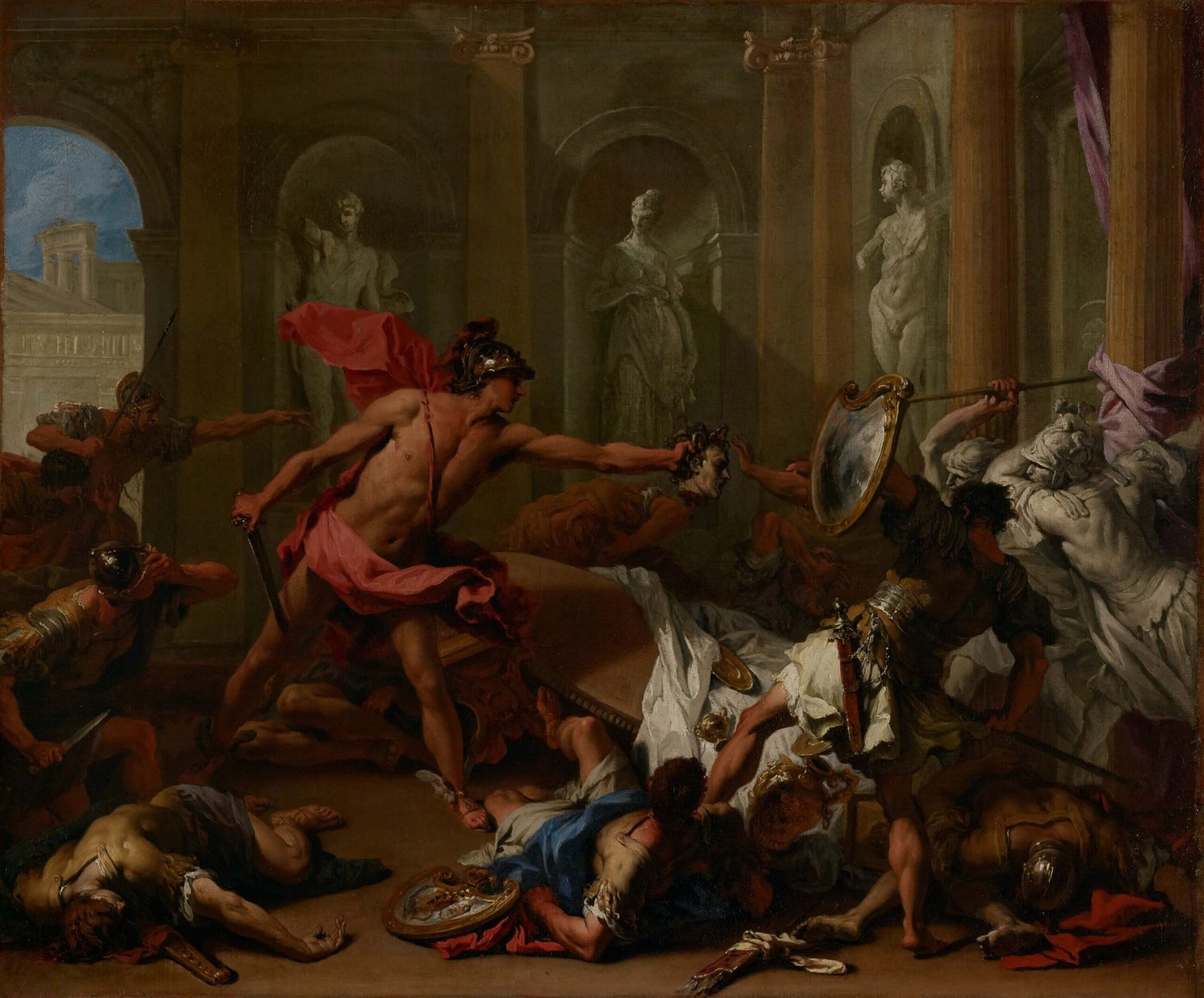
In Greek mythology Perseus is the legendary hero, who had slain Medusa. He is the personification of a true revolutionary in ancient Greek legends, politically pursued because of his amazing philosophical ideas and maliciously segregated, by the vile power of tyranny. Perseus had also turned into stone the titan Atlas, who was obliged to hold the sky for the eternity and saved Andromeda (the princess of Aethiopia) from the evil maritime creature, that was about to devour her alive.
Perseus’ birth and childhood
Acrisius, the king of Argos received a very unpleasant prediction from the Oracle of Delphi. The priests foretold him that the son of his own daughter would bring him death. Afraid of such a heinous misfortune, Acrisius did everything to avoid his destiny. He confined his daughter Danaë inside the bronze chamber in the garden of his palace. Thereafter he always kept her in prison in order to avoid her pregnancy and the bith of the child.
However, the bronze chamber, there the young princess lived as a prisoner stood open to the sky. For that reason, one starry night, Zeus, descried Danaë from above and flew inside, forcing the youthful maiden into a love affair.
Soon afterwards, Danaë got pregnant and gave birth to a little boy, that she decided to call Perseus. By the time when Acrisius discovered them, he became extremely fretful about his future. He didn’t hesitate about adopting harsh measures and opted to use even more violence upon his own daughter and grandson.
However, Acrisius didn’t dare to angry Zeus and the gods of Olympus. As a matter of fact, he found another evil way to destroy Perseus. He ordered to lock up his daughter and grandson inside an enormous wooden chest and told his servants to cast them into the sea.
Thereupon and after a long journey, the chest with Danaë and Perseus washed ashore on the island of Seriphos. The local fisher, named Dictys had found them alive and gave them shelter. He was a good man and did everything for his new guests. In fact, his daily fish catch was abundant and his brother was the king Polydectes. He governed the island with an iron hand in a velvet glove.
The beginning of the journey to find Medusa
When Perseus had grown to manhood, he became an agile athlete and wise young man. However, he resulted to be superfluous and disturbing for the king of the island. Insofar as Polydectes was infatuated with his mother and planned to force her into marriage, but Perseus always avoided that.
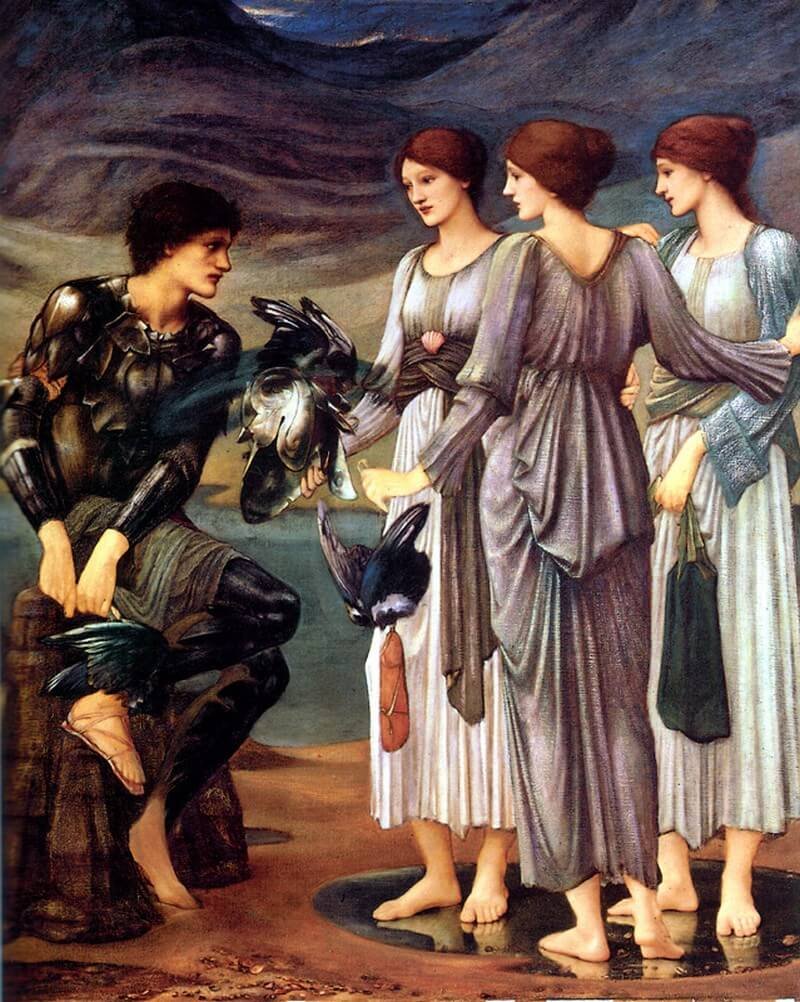
Therefore, and as a mighty king, Polydectes plotted to get rid of the hero and decided to cast him away for a certain death. He made a banquet, faking to collect gifts for the hand of Hippodamia, the princess of Pisa.
As a result, he demanded Perseus to bring a horse. However the youngster couldn’t permit himself to make such a purchase. Thus, Polydectes required him to obtain another gift in exchange. Perseus had to bring the head of the fearsome Gorgon Medusa, whose glance of eyes turned people into stones.
Athena and Hermes help Perseus
Perseus did not refuse the challenge and went away to accomplish the quest. He wandered aimlessly for a certain time, until Athena and Hermes advised him to find the Hesperides. The three youthful maidens could provide him the artifacts to defeat Medusa. Thereupon and after having located their sisters, the Graeae, the hero managed to obtain information from them. Inasmuch as he stole their single eye and obliged them to speak. The Graeae felt afraid to lose their sight forever and told Perseus about the whereabouts of their youthful siblings.
Thereafter Perseus made a short journey and managed to speak with the beautiful nymphs. They gave him a magic knapsack, where he needed to contain the head of Medusa, and the helm of invisibility, which would make him invisible. In fact, Perseus had to wear it in order to slay Medusa without gazing at her eyes, while using the shield of Athena and looking behind.
Perseus kills Medusa
That being so, Perseus had also received the polished shield from Athena and the curved adamantine sword with winged sandals from Hermes. He felt ready to accomplish the feat and set off on his further journey. He rushed through the air, towards the ominous island of the Gorgons, meanwhile the sea shined below his feet.
Once in place, and after having descried Medusa from above, the hero rushed to her, awakening the vile monster from her pleasant drowse. He performed an outstanding blow with his adamantine sword and decapitated her terrible body.
Soon afterwards, the immortal sisters of Medusa had woken up, because they heard the screams of their dying sister. However, Perseus managed to escape quickly. He used Hermes’ winged sandals and meanwhile being completely invisible due to the magic helmet, rushed all the way back to Seriphos.
Another feats of Perseus
Perseus was not only the slayer of Medusa, and the killer of vile kings. He performed another incredible feats, which demonstrated his courage and value. On his way back, Perseus saved Andromeda from the monstrous whale Cetus. He managed to accomplish such a feat by dint of his own strength and agility. In fact, he wielded his sword as a marvelously skilled swordsman.
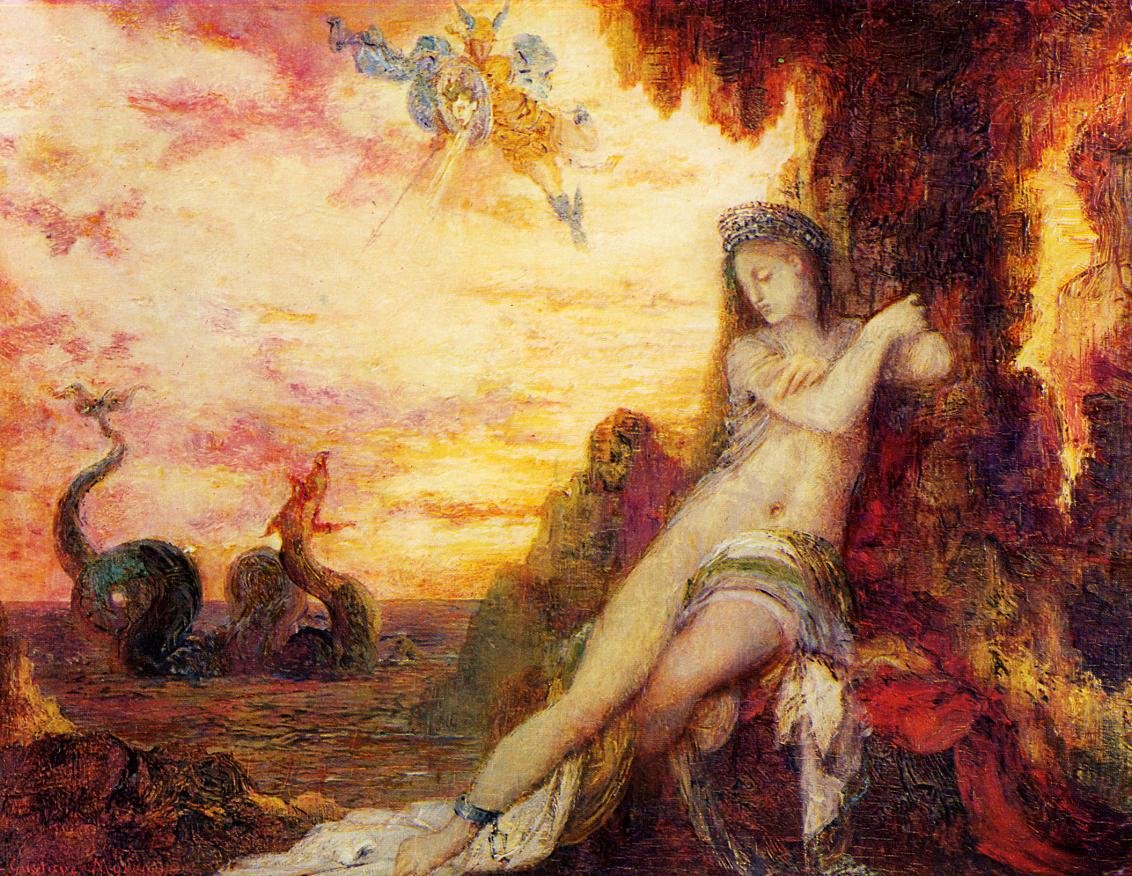
Although some sources might tell, that the head of Medusa was the reason of his victory, according to Ovid, Perseus did not use it to slay Cetus. In contrast he managed to kill the monster only by means of his sword, incredible strength and expertise. As a matter of fact, the organs of sight of the big marine creatures are generally placed on each side of their head. Furthermore, the big predators, such as sharks always close their eyes, while attacking their victim.
Therefore, Perseus had probably killed Cetus, using only his sword and muscles. That is to say, the extraordinary power of Medusa’s head not always helped Perseus. He won several key battles by himself because of being a strong, agile and skillful warrior.
Later, during his wedding feast with Andromeda, the hero was attacked by Phineus and his large troop of soldiers, who pretended to take their vengeance upon him. As it follows in the legend, Perseus managed to kill entire hordes of Phineus’s mercenaries with his only sword. However finally he was surrounded by other countless throngs of foes and had to employ the head of Medusa. This way he avoided being hurt in the battle.
Therefore, it seems to be, that the great founder of Mycenae and legendary hero of Greece, was not only a very skilled fighter and athlete, but also a thinker and merchant. He discovered the philosophical and military source of power, able to turn all kind of people into stone.
Not all the battles must be won by the means of strength. The sword of Perseus belonged to Hermes, who was the god of trade. And Athena, the goddess of wisdom acted as his main patroness and motivator. Therefore, Perseus not only used philosophy, science and art to obtain military victories along his life. He had probably employed Athena’s knowledge in the world of trade, amassing a great fortune and becoming even more powerful, because of it.
As a matter of fact, Perseus had turned his adversaries into stone by dint of the truth, prohibited by the administration of tyranny. The hero became rich and powerful because of philosophical, artistic and scientific wisdom, unknown and forbidden by the kings. He amassed a fortune, gained a reputation and formed an army. Afterwards he petrified all kind of rich and vile enemies, using the power of destroyed lies and acts of tyranny. The head of Medusa personified the power he held because of having destroyed these lies and acts of tyranny.
On the other side, the goddess Athena had usually encouraged the legendary hero for the fight. That is, some kind of ideology and axiomatic philosophical thoughts had always inspired Perseus.
The political meaning of Perseus
Finally, at the end of his journey, the slayer of Medusa turns into stone his adversary, the vile king of Seriphos and manages to free Danaë from his harassment and persecution. He returns all the magic items to the Hesperides, and hands over the head of Medusa to the goddess Athena, as a sign of his great esteem and admiration.
A time after, during the sporting contest at Argos, Perseus kills accidentally his grandfather Acrisius, while throwing a heavy discus. Thus, the prophecy of the Oracle comes true. So, here is one of the important meanings for the myth: Perseus slays the institution of monarchy, personified by his own grandfather. The hero could have been a king, like his ancestor, but otherwise he chose the path of honor, justice and selflessness.
The slayer of Medusa plumbed for democracy and freedom. In fact, the sporting contest, he had arranged in Argos is a hidden allusion to the education of young leaders and democratic process. Perseus will transfer his political power to the winner of this contest at the end of his rule.
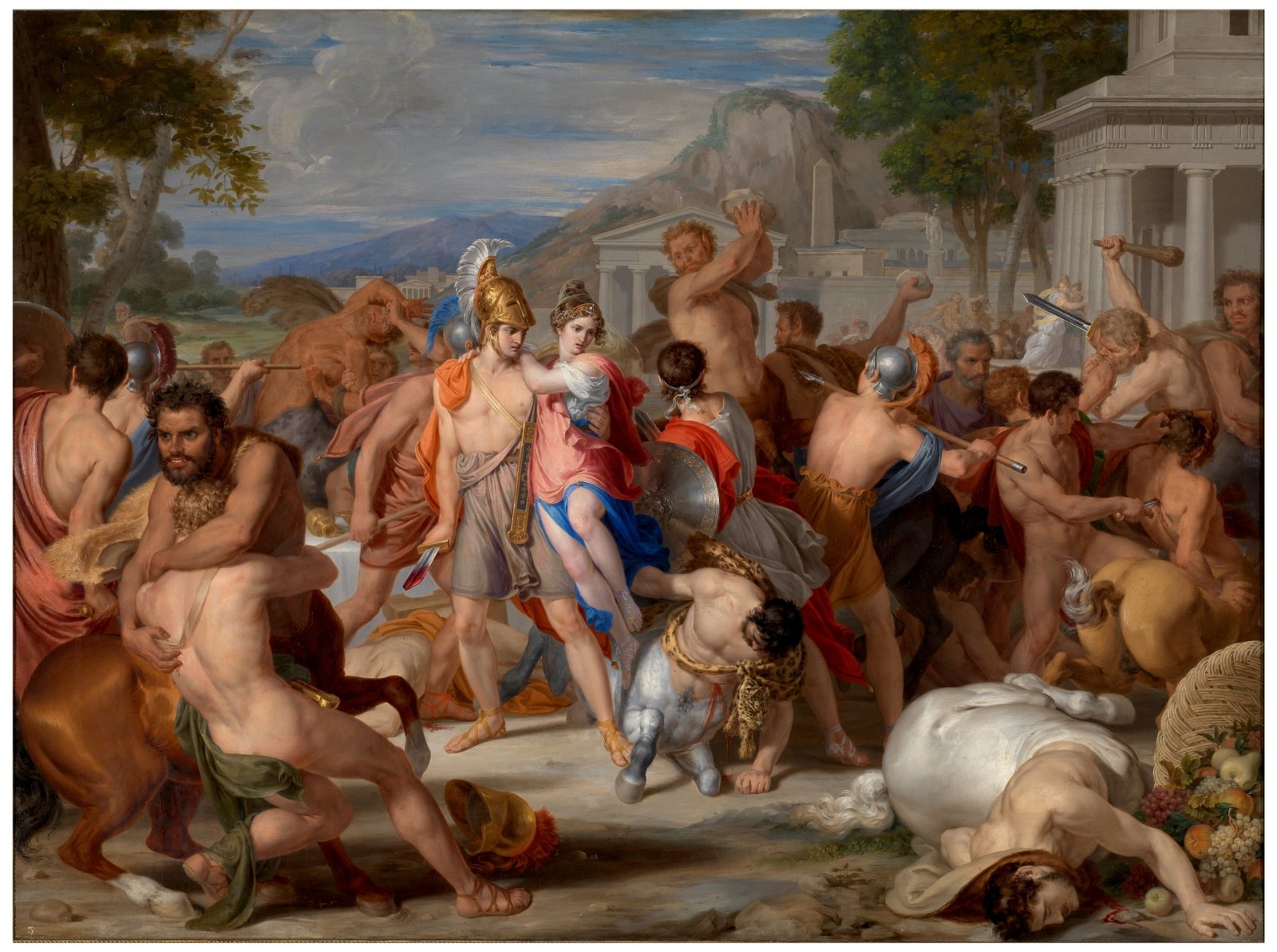
In addition to sports and military disciplines, these young candidates have to be strongly formed in philosophy, handicraft, trade, arts and science. According to the story of Medusa, Perseus becomes a king as well, founding the city of Mycenae. However, the allegory of the story is universally anarchist, democratic and republican. Insofar as in the times of Ancient Greece the open mention of Athena’s anarchism would have supposed death penalty.
On the other side along the whole legend Perseus did the opposite of his grandfather and the king of Seriphos. That is, he behaved as a courageous, honorable, just and intelligent person. The head of Medusa embodied the smashed lies and acts of tyranny. And Perseus used this power to free humanity in the name of Athena.
The slayer of Medusa in the real life
Somehow, the myth of Perseus is also the story of all the great geniuses, constrained by the weak and stupid. In fact, the success of the most talented individuals is frequently frustrated by the circumstances or the most insidious people.
Only the weak, the vile and the incompetent have the right to win. They behave like a political flock of scoundrels, making the talented individuals to be their sworn enemy. The glorious, heroic and fair persons need to die, because the weak and vile are eager to get their absolute power. Thus, they try to push their pathetic anti – values into the newest principles of the world. It happens naturally, without any kind of conspiracy and cunning ploy, thus the wicked, reprobate king just needs to appear between the crowd and take his political power upon people, giving them an enemy, a sort of national vanity and legal restrictive regulation.
On the other hand, Perseus would never be able to do such a thing, because he is the opposite of the mass and its sworn enemy, full of perfection. However, year after year, the citizens begin to be abused by their evil rulers. Thus, they invent and tell stories about popular heroes such as Perseus, who would be fighting for their rights and freedoms against the lawful injustice.
Nonetheless, the slayer of Medusa is not welcome neither by the kings nor by their subjects. In fact, he is destined to stay alone for a long time and has to reflect about the life and philosophy. At this time, he perceives the existence of Medusa and its widely spread deceits for the first time. The deep understanding of philosophical thoughts and hidden secrets of art, make Perseus to be much stronger. He becomes wiser and much more skillful, of what he could ever have been.
Henceforth the hero makes his adventure and slays Medusa, that embodies the acts and lies of tyranny, which the tyrants used to enslave people and pervert the justice. Flying away from the island of the Gorgons, he leaves behind her immortal sisters. Two deathless gorgons, that might serve of a great help for his cause of freedom. Insofar as self-profit and the philosophy of violence are necessary to raise capital, and destroy the nasty villains.
Furthermore, the simple men of Antiquity, Christianity and Communism tried to destroy them, willing to suffocate the spirit of strength and free thinking. Because of envy, anxious power of flock and baleful resentment of idiots.
Eager to kill the origins of heroic individualism, the simple men invented another mortal lies and acts of tyranny, forbidding the immortal gorgons of self-profit and the radical philosophical realism (The so-called Violence).
As the wise sages of Antiquity would suggest: employ the immortal Gorgons to smash the tyranny, and Perseus did. He was a strong hero, a rich merchant, a great philosopher and great artist. A true anarchist.
He built the great social-utopia, named the Ideal State of Athena and killed his grandfather Acrisius, who embodied the spirit of aristocratic fear, decay, favoritism and monarchy.
